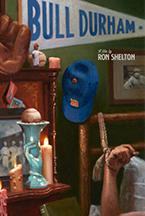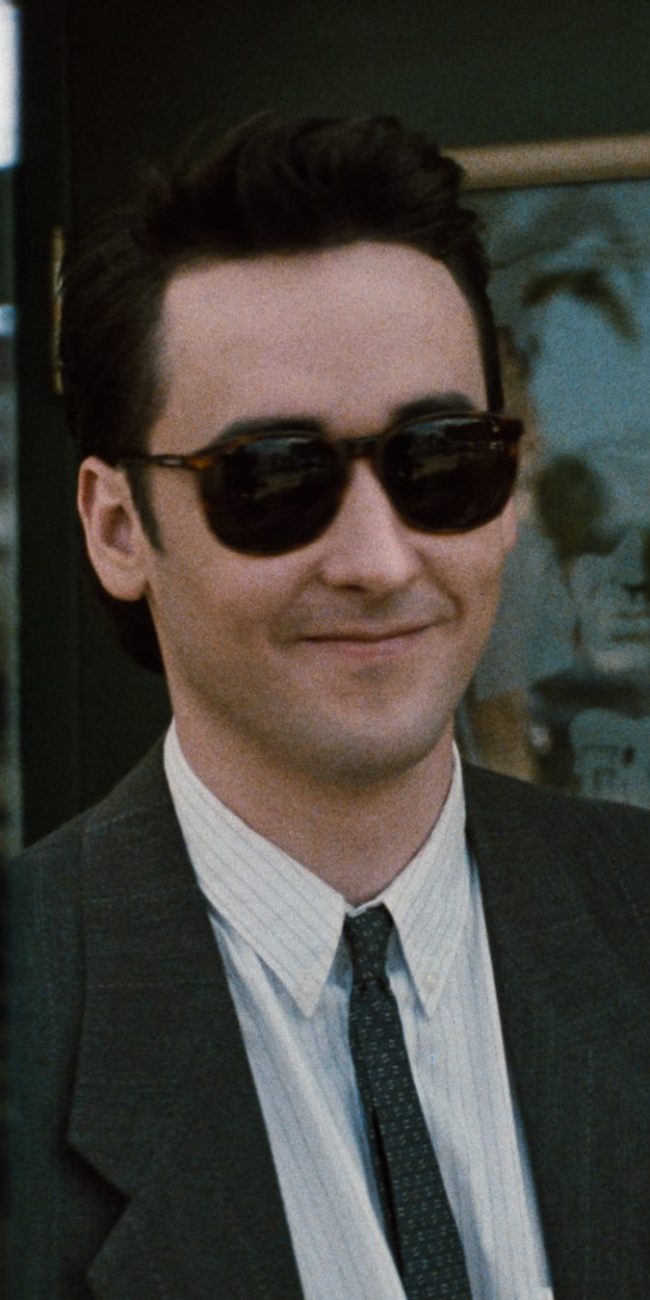THE CURBSIDE CRITERION: BULL DURHAM

(We here at Hammer to Nail are all about true independent cinema. But we also have to tip our hat to the great films of yesteryear that continue to inspire filmmakers and cinephiles alike. This week, our new addition to the site, “The Curbside Criterion” continues where HtN staff can trot out thoughts on the finest films ever made. This week Brad Cook swings into the new Blu-Ray release of Bull Durham, one of the finest sports films ever made.)
I’ll admit I’m one of those people who can’t pass up Ken Burns’ Baseball documentary every time I come across it on TV. I even own it on DVD. Baseball was the first sport I followed as a kid, and it will be the last one in my brain when I’m old. How can you not appreciate a baseball game on a warm summer day? And how can you not appreciate the sport’s long, century-plus history full of the thrill of victory and the agony of defeat?
But I also love this sport because of the other side of that coin, which contains things like Curt Flood sacrificing the rest of his career to challenge the reserve clause, Jackie Robinson enduring obscene racism to break the color barrier, and the sad end to the life of Eddie Gaedel, the shortest player to ever have a plate appearance, thanks to a publicity stunt. It’s not that I love such incidents, of course – it’s that they make me appreciate the sport in its totality, from the epic feats to the little-known failures.
The other side of the coin tempers the romanticism, and that’s why I put a movie like Bull Durham above such saccharine fare as Field of Dreams. Susan Sarandon’s Annie Savoy is the perfect embodiment of baseball’s yin and yang, a woman “cursed with self-awareness,” as she says, a whip-smart, well-read, strong-willed woman who spends every summer at the ballpark of the minor league Durham Bulls. She also spends many of those hot, humid evenings with one of the players on the team, but this year she finds herself torn between empty-headed phenom “Nuke” LaLoosh (Tim Robbins) and wise career minor leaguer “Crash” Davis (Kevin Costner), who’s been summoned to help LaLoosh make it to the big leagues while he winds down his time in baseball.
In some ways, this isn’t really a film about baseball, an idea that director and writer Ron Shelton hints at on this new Criterion Blu-ray. He talks about how Bull Durham is a love story – “And we all need love,” he adds. It’s also about Annie and Crash learning when it’s time to close her bedroom door to everyone else and hang up his cleats, respectively. And it’s about Nuke figuring out how to mature so that his time in the majors doesn’t end in a return trip to the minors and a career trajectory like Crash endured.
Shelton was interviewed by film critic Michael Sragow for a 19-minute bonus feature that’s the only new item in this release, aside from the fact that the movie was remastered in 4K. Shelton looks back on the film and how his own time as a minor league player informed his story choices. He admits that before he started making sports movies, he didn’t enjoy most of the ones he saw in theaters, with the exception of some 1960s entries like The Hustler. (Yes, if you assume pool is a sport. Feel free to debate that below.)
The other stuff in this edition was either ported over from earlier home video releases or is archival in nature:
Two audio commentaries: The first one is Ron Shelton’s track from the 1998 DVD. It retreads some territory covered elsewhere in the bonus features, such as how he drew from stories he heard and things he experienced in the minors for the script (apparently players in Puerto Rico really do use voodoo on their bats). He also discusses some deleted scenes, although they’re not found elsewhere on this disc, except in an interview where he mentions that “clown prince of baseball” Max Patkin was going to die during the movie and there would be a funeral for him – there’s a cut to a still image from that scene. He points out in the same interview that Annie wears a veil in one scene, something he says no one has ever asked him about.
The other commentary is with Tim Robbins and Kevin Costner, who chat about how they got involved in the film and their approaches to working with each other, since they’re in most of the scenes together and their characters’ relationship goes from mutual disgust to mutual respect. However, they do fall into the trap that just about every multi-participant commentary falls into: Sometimes they end up just watching the movie and discussing what’s on the screen, or laughing at funny dialogue. This track was originally found on the 2002 Special Edition DVD.
Between the Lines: The Making of Bull Durham (29 minutes): This making-of piece was also ported over from the 2002 DVD. It features the major cast members, as well as producer Thom Mount and a few others. Fun fact: Mount is from the Durham area and became a part owner of the Bulls several years before the movie was made. He said at the time that he would make a movie there some day, which was dismissed as “the usual Hollywood talk.” Just goes to show that you never know where life will take you.
The Greatest Show on Dirt (19 minutes): Created in 2008, this look back on the movie features several pro players, including a few who played for the Bulls, talking about its depiction of life in the minor leagues. Unsurprisingly, Shelton was pretty close to the mark with the way he portrayed the subject matter.
Today (4 minutes): This is a segment from the Sept. 19, 1991 episode of NBC’s morning Today show that profiles Max Patkin, also known as “the clown prince of baseball.” He’s shown briefly in Bull Durham.
NBC Nightly News (3 minutes): Airing in Sept. 1993, this news piece talks about the final home game at the Bulls’ original home stadium, which was built before World War II and was used in the movie. The newscaster lays it on a bit thick with all the “It was a simpler time” stuff. (See my comments at the top about the yin and yang of baseball.)
The film trailer tops off the platter, and the obligatory printed booklet features an essay by New Yorker baseball writer Roger Angell, who points out, “I always try to avoid sentimentality in writing about baseball.” Good.
– Brad Cook (@BradCWriter)











